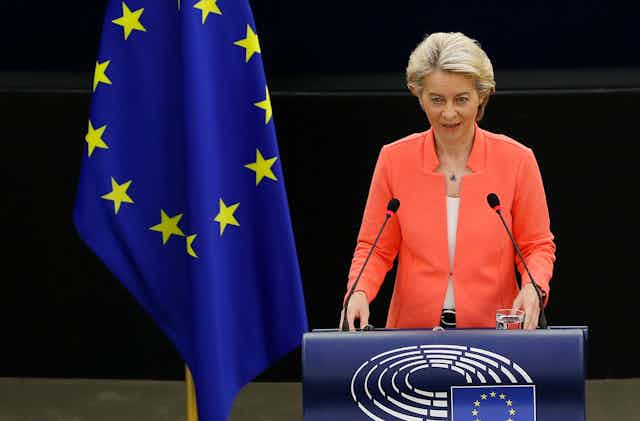In her second “state of the European Union” speech, European Commission president Ursula von der Leyen used the political momentum generated by a series of crises to announce a batch of new initiatives and funding.
Von der Leyen is confident she’s steered the EU successfully through the challenges of COVID, but the bloc still faces the threats of climate change, security and defence challenges, tech and economic competition, and political struggles among and within member states.
Missing was an honest acknowledgement of the ongoing, grievous rule of law infractions in Poland and Hungary (including the progressive erosion of democracy, judicial independence and media pluralism) as well as a clear plan to mitigate the ongoing fallout in Afghanistan and rebuilding relations with the UK.
COVID challenges
Having pulled back from the precipice of a full-blown disaster over vaccine rollout a year ago, Von der Leyen could justifiably boast about 70% of EU adults are now fully vaccinated. She conceded that complacency still posed a threat, from the widely varying vaccine rates to the risk of new variants in many member states.
Europe’s responsibility now appears twofold. With a €50 million cash investment between now and 2027, the EU is putting more energy into establishing a European Health Union, on the basis of the existing European Medicines Agency, the recent rollout of EU digital health certificates, plus a new pan-European health authority.
Externally, the EU must play a greater role in accelerating global vaccine distribution.
The EU’s commitment to the COVAX programme is admirable, to be sure. But -– as MEPs quickly pointed out -– the EU is continuing to block the waiver on intellectual property rights on vaccine patents, limiting the ability of non-EU producers to manufacture and distribute vaccines more widely.
Furthermore, European companies themselves are not precisely supplying vaccines abroad, but selling them – and not necessarily to countries in the most need.
Economic recovery
Europe’s economy appears to be recovering well from COVID. Estimates for the second quarter of 2021 indicate growth has risen by 2.0% in the Eurozone and by 1.9% in the EU as a whole. This is a good shift of direction after a disappointing first quarter, which saw GDP decline by 0.3% in the Eurozone and 0.1% in the EU.
However, China and the US, the EU’s chief economic and trade rivals, have also seen rapid post-COVID growth. The challenge for the commission is to ensure that the EU remains at the top of its game in terms of trade deals, competition and output.
The EU needs to send clear signals to markets and investors, so expect further developments arising from the upcoming Economic Governance Review. The message now is that the EU single market is open for business, and prepared to take on competitors.
Indeed, Von der Leyen suggested that the single market is not merely the motor of employment and competition, but a driver of industrial innovation (including artificial intelligence), and a “gatekeeper power” for democratic reform of big tech – keeping firms like Amazon and Facebook equitable and accountable in their practices.
She also unveiled a plan to enhance work on semi-conductors (tiny chips that make everything from smartphones to electric trains work) to reduce Europe’s dependence on Asian markets.
Climate change
The EU has worked hard to forge, and maintain, its green credentials, sometimes clashing with member states on targets, costs and public opinion.
Von der Leyen’s preferred stick and carrot approach – tough regulations offset by generous support packages – is unlikely to change as the EU prepares for COP26, the global climate change conference in November.
In readying the EU for its leading role, she pledged a further €4 billion (beyond the existing US$25 billion yearly) aimed principally at getting China and the US to close the climate finance gap.
Despite the ambitious European Green Deal and the target to cut emissions by 55% by 2030, many would still argue that the commission has still not done enough.
There was no mention of tackling soaring energy prices, or how to equitably redistribute the cost of climate change measures beyond the Social Climate Fund used to alleviate energy poverty among vulnerable households and small businesses across Europe.
Security and defence
Perhaps most surprising was the lack of any clear guidance on Europe’s role in supporting the increasingly dire situation in Afghanistan. There were lukewarm platitudes for the Afghan people, but by stating that Europe’s support was for Afghans “in the country and in neighbouring countries”, the EU’s contribution feels remote at best.
Instead of clarity about the use of the new Afghan support package, or the reworked pact on migration and asylum (mentioning the Mediterranean rather than Afghanistan), Von der Leyen referenced the renewed EU-Nato joint declaration and the European Defence Union, a project to gradually enhance Europe’s overall strategic abilities in security and defence.
Providing stability in Europe’s neighbourhood needs to include far more than the endless trope of the EU becoming – in Von der Leyen’s words – a “unique security provider”, or the need to push back against disruptive technology, or even the need for yet another new centre to enhance intelligence-gathering.
Britain who?
Notably absent was an assessment of the EU’s post-Brexit relations with the UK. Von der Leyen might have used this opportunity to voice disappointment at the increasingly fractious trade and diplomatic relations arising from the 2020 Brexit deal, or even pressed the “reset” button by engaging with Britain on defence in new ways
Few expected a wholesale rehabilitation at this point, but failure to connect Britain -– even loosely –- to EU security policy, work in the western Balkans, the new Trade and Technology Council (developed in tandem with the US), or the EU’s new “Global Gateway” strategy to boost business, seems a missed opportunity.
Let’s hope the next year provides opportunities for the EU to work harder on its own jobs list, remembering that cooperation with others makes those jobs much more challenging.

